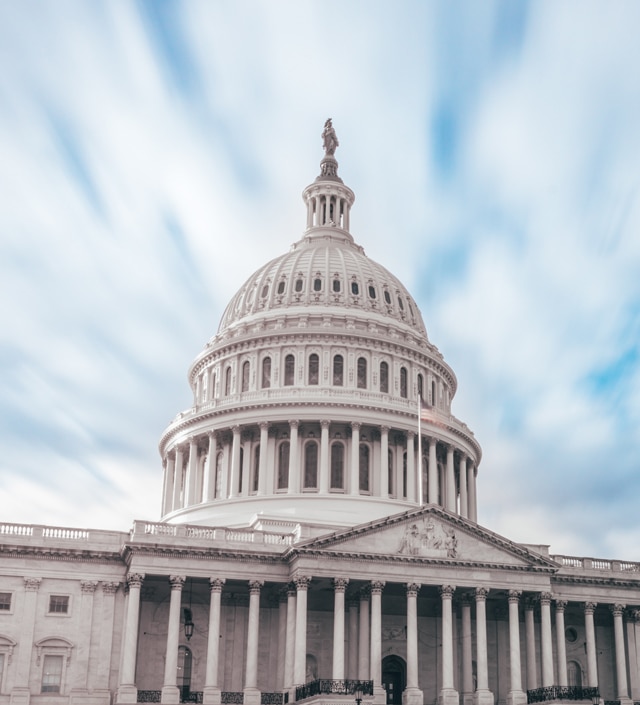Editor’s Note: This article is part of a series that Rethinking65 is doing on viewpoints of industry leaders who attended the Schwab Impact 2023 conference.
The weeks-long struggle to find a new Speaker of the House and threats of another government shutdown have put a lot of people on edge, but it’s more critical for advisors to focus on the regulatory proposals brewing inside the beltway.

That’s the message shared by Mike Townsend, managing director of legislative and regulatory affairs at Charles Schwab & Co., during a breakout session he led on October 26 at the Schwab Impact 2023 conference in Philadelphia. The session was titled “Washington Watch: The Regulatory and Legislative Landscape for RIAs in 2024 and Beyond.”
Townsend, based in the nation’s capital, is part of Schwab’s team of six that watches what’s happening on Capitol Hill, inside the White House, and at the SEC and Federal Reserve.
“I kind of think of my job as trying to help you cut through all the noise and the nonsense in D.C. and focus on what’s really important. And as you know, we’ve been pretty heavy in the noise and nonsense category of things over the last few weeks,” he said. [Rep. Mike Johnson (R-La.) was elected as Speaker of the House October 25.]
However, “I actually think it’s the regulatory side of things that is much more important for advisors to pay attention to,” said Townsend.
The new SEC proposals in particular “really seem to go at go at almost micromanaging how you do your business and how you interact with your clients and how you interact with your business partners,” he said. “So, a lot of concerns here.”
Good karma?
Before diving into the regulatory landscape, Townsend shared some historic markets data. Although past performance is no guarantee of future results, there’s no precedent triggering alarm bells.
- With a Democratic president and a split Congress (which has only happened 3.8% of the time since 1901), the Dow Jones Industrial Average has seen an average annualized gain of 8.9%.
- Historically, stock performance is strongest in the year before an election — an average return of 13.5% in the S&P 500 going back to 1928.
- The last five government shutdowns were positive for the S&P 500. And if you look at government shutdowns going back to the mid 1970s, the market was essentially flat.
“The stock markets historically just don’t care about government shutdowns. The debt ceiling tends to be a bigger deal in the markets,” says Townsend. However, “the debt ceiling is off the table until mid-2025.”
Secure 2.0 highlights
“Secure 2.0 is now the law of the land,” Townsend added, moving on to regulations, and many of its provisions take effect in January 2024. He anticipates seeing “a flood of guidance” by then.
A number of Secure 2.0 provision are voluntary for employers, he said, such as matching an employee’s student loan payments with a contribution to their 401(k), and companies will look to see what others are doing.
Secure 2.0 also adds to the list of reasons that permit people to take money from their retirement accounts without penalties, he said.
“I don’t think anyone argues with them from sort of a concept standpoint. For example, I don’t think anyone thinks that domestic violence victims who need access to some money shouldn’t have penalty-free withdrawals,” he said. Yet the trend about the expanded number of reasons for early withdrawals is kind of being debated in Washington, he said.
Roth delay
Employees earning more than $145,000 a year won’t have to worry yet about putting their catch-up contributions in a Roth account, said Townsend. The IRS delayed this Secure 2.0 provision until 2026 after employers, recordkeepers and others in the retirement planning space came together and said they wouldn’t be ready to do this, he noted.
Many companies don’t even have a Roth 401(k) option, said Townsend, and the mechanical process “I think was daunting for lots of businesses.”
Continued push for SALT relief
On the tax side, he noted that a coalition of representatives from New York, New Jersey, California, Massachusetts, Illinois and a few other states are still seeking to boost the state and local tax (SALT) deduction. Previously unlimited, the deduction was capped at $10,000 in 2018.
“It’s a very vocal group and it’s not a straight party line” pushing to restore the SALT deduction, Townsend said. “I don’t see that happening anytime soon, but it continues to be a big issue.”
Sunset tensions
Meanwhile, a new Congress will have to deal with the 2017 tax-cut provisions set to expire at the end of 2025, says Townsend. This includes changes to the standard deduction, individual tax rates and estate taxes.
Objecting to a tax cut when it expires “is basically a tax increase, and that becomes politically challenging,” he said.
Townsend is keeping a particularly close eye on the estate tax, which he says is probably the least partisan tax issue. “Democrats and Republicans represent states that have heavy ranch constituents, family farms, multigenerational-owned businesses.” It’s possible the estate tax could get broken off and addressed separately from other tax legislation, he said, “because there is support, I think, on both sides of the aisle for not letting that just expire.”
If we get another split Congress, the estate tax rate could ultimately fall at a midpoint between its current and previous levels, he said. “That is pure speculation, because we don’t know exactly what the landscape is going to be, but definitely something to watch going forward.”
Crypto and AI confusion
Cryptocurrencies and artificial intelligence are a couple of new issues “very much on the radar screen right now,” said Townsend. Both parties would like to add some structure to the largely unregulated crypto space, but no one can agree on when cryptocurrencies are securities, commodities or something else, he said.
House Republicans are moving forward with a bill that would give the Commodity Futures Trading Commission (CFTC) more jurisdiction over cryptocurrency, said Townsend, but the SEC has been more aggressively asserting its jurisdiction. Earlier this year, the SEC sued the two largest crypto exchanges, Binance and Coinbase, he noted.
“Meanwhile, I just don’t know that we’re going to find that kind of bipartisan approach to crypto,” he said — something people seemed more optimistic about earlier this year.
A theme that crypto and AI share is “the number of people in Washington who understand these two issues could easily fit in this front row,” said Townsend. But he noted that the Senate, which convened an AI forum in September with big-tech leaders, is seeking more education.
As for regulatory guardrails, “I think there’s a real chance that you could see something in 2024 that has bipartisan support; but again, super-complicated issue,” said Townsend.
Equity market overhaul
Moving onto the SEC, Townsend noted that the commission has a series of proposals‚ spanning 1,700 pages, for overhauling the equity-market structure. These proposals call for sending most retail trades to an auction system at the exchanges, permitting smaller tick sizes to trade at fractions of a penny, implementing new best-execution standards, and adding more disclosure and transparency for investors.
“Schwab has written multiple comment letters to the SEC trying to explain how complicated and potentially disruptive this will be,” said Townsend.
Mutual fund proposals
The SEC also has a liquidity-risk-management proposal for mutual funds that requires funds to go to swing pricing when there are net redemptions (adjusting net asset value at that time in order to pass on the cost to transacting investors without diluting value for remaining shareholders). He’s not sure if that aspect has teeth because the SEC eliminated a swing-pricing provision this summer when finalizing its proposal for money market funds.
“If they didn’t do swing pricing in the money-market fund context, it’s hard to see how they can do swing pricing in the broader mutual fund context,” said Townsend, noting the final rule may end up looking very different.
The mutual fund proposal also calls for a “hard 4 p.m. close,” which would mean earlier cut-off times for fund trades — such as late morning on the West Coast, he said. Overall, “it just makes mutual funds a less attractive product.”
ESG conundrum
Townsend is also watching ESG-related proposals. One controversial proposal would require public companies to disclose more to investors about the risks they face. “The SEC keeps saying they’re going to try to finalize this by the end of the year,” he said. “I think whatever happens, this is guaranteed to be litigated in court.”
The SEC also recently updated its longstanding “names rule,” which would require funds that use certain words in their name to invest 80% of their assets to fit that description, said Townsend.
“This rule does not just apply to things like green and sustainable, but it applies to all sorts of words – growth, value, international, any type of fund that has a geographic name and that sort of thing,” he said.
Meanwhile, the years-long fight over DOL ESG rules for retirement plans continues and “ESG issues are likely to be fiercely debated in 2024 … and beyond,” Townsend noted in a slide.
‘Maybe we need to step back’
Regarding the proposed SEC rules, “the overarching theme, from my perspective, is they are very prescriptive in how advisors run their businesses,” said Townsend.
One that he thinks is a big deal is a relatively new SEC proposal on conflicts and predictive data analytics. “It appears to cover any advice interaction that involves technology,” he said, including Excel spreadsheets that advisors put together to talk to clients about.
In addition, a cybersecurity risk-management proposal has very specific requirements about how to interact with third-party vendors, and an expanded custody rule proposal covers more assets and requires written agreements with custodians, said Townsend.
Advisors can write to their congresspeople and file SEC comments that basically say, “There’s a lot here and maybe we need to step back and consider how these all work together and how these impact the business,” said Townsend. “It’s particularly important for small RIAs for whom the burden, I think, is going to be really difficult.”
Additional priorities
The Department of Labor’s fiduciary rule is coming back soon for the 14th year, said Townsend. “Definitely keep an eye out for that.” [The DOL announced its proposed rule on Oct. 31, which various industry groups are scrutinizing.]
And the No. 1 thing the SEC is focusing on in its 2024 examination priority list, released in mid-October, is the use of personal devices to conduct business, said Townsend. “Big, big Wall Street firms have gotten dinged on this,” he said, and everyone down to small RIAs must have a policy around the use of personal devices and ensure employees understand it.
Some perspective
Near the end of Townsend’s session, an audience member said, “It seems that both parties consistently pass legislation with no thought as to how this stuff can actually be implemented. Is that correct?”
“Yes, that was an easy one!” replied Townsend, triggering audience laughter. “I’ll use the SEC as my punching bag for the moment: I think what is happening is that the SEC, for example, is solving problems on paper that don’t really reflect how people actually run a business or do a business or interact with clients.”
“There are years’ worth of regulations that come out,” he said, “and the IRS or the SEC or whatever agency has to interpret what Congress meant by that and then try to make that work in the real world. So yeah, I think it’s a big, big flaw of assessment.”
New retirement champions needed
Capitol Hill is also at a bit of a crossroads as the two people who drove the retirement-savings effort for a quarter-century move on, said Townsend. Former Sen. Rob Portman (R- Ohio) retired at the end of 2022 and Sen. Ben Cardin (D-Md.) is retiring at the end of this Congress.
“There’s no real obvious successor as to who is going to be kind of the voice and champion for retirement savings,” said Townsend.
Jerilyn Klein is editorial director of Rethinking65.







